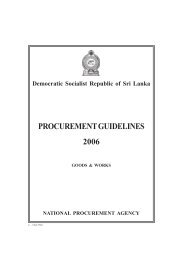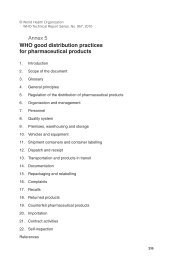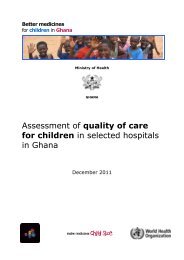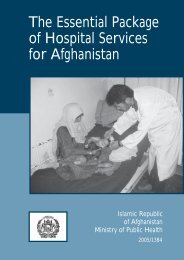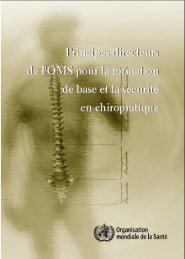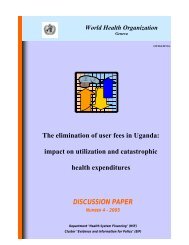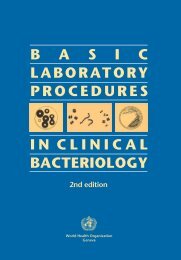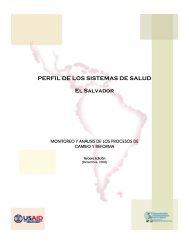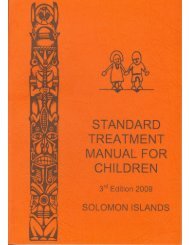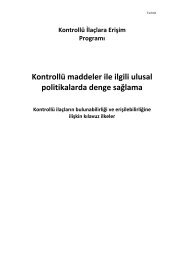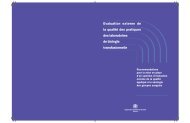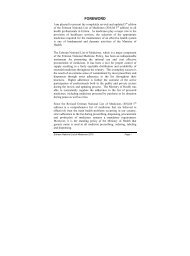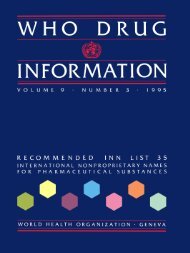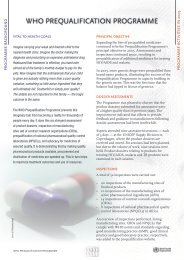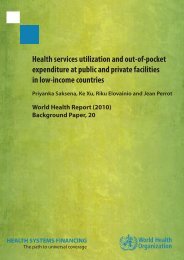WHO Drug Information Vol. 24, No. 4, 2010
WHO Drug Information Vol. 24, No. 4, 2010
WHO Drug Information Vol. 24, No. 4, 2010
Create successful ePaper yourself
Turn your PDF publications into a flip-book with our unique Google optimized e-Paper software.
<strong>WHO</strong> <strong>Drug</strong> <strong>Information</strong> <strong>Vol</strong>. <strong>24</strong>, <strong>No</strong>. 4, <strong>2010</strong><strong>WHO</strong> PrequalificationProgrammes<strong>WHO</strong> Prequalification of Medicines Programme:survey of service quality provided to manufacturersEstablished in 2001, the Prequalification of Medicines Programme (PQP) is a serviceprovided by the World Health Organization (<strong>WHO</strong>) to facilitate access to quality medicinesfor treating priority diseases. In order to be prequalified, medicines must meet<strong>WHO</strong>-specified standards for quality, safety and efficacy. PQP is supported by variousUnited Nations agencies (e.g., UNAIDS, UNICEF, UNFPA) and the World Bank.<strong>WHO</strong> prequalification of medicines is a multi-step process whereby a manufacturersubmits extensive information that is then evaluated by a <strong>WHO</strong> assessment teamwith respect to product quality, safety and efficacy, site(s) of manufacture and anyclinical studies that may have been carried out during development. Products thatsuccessfully pass PQP evaluation are listed on the <strong>WHO</strong> List of Prequalified MedicinalProducts (see: http://www.who.int/prequal). This list provides UN agencies with asingle source of reference for quality-assured priority medicines and is also used bya variety of entities, both country-specific and international, that purchase medicinesin bulk quantities.The Prequalification of Medicines Programme has conducted a comprehensive surveyamong pharmaceutical manufacturers to assess its level of service. PQP assessmentand inspection activities reflect those carried out by national regulatoryauthorities before granting marketing authorization (registration) for a medicine. Theassessment review was therefore designed to maximize the diagnostic capability ofthe survey: to measure both the level of service provided by PQP and the levels ofservice expected from regulatory authorities by manufacturers. The survey includeditems relevant to the assessment of product dossiers and on-site inspections of manufacturingfacilities in a way that separated service design (the service process) fromservice delivery (or the “people” aspects of service). The results of this survey providedirection for improvements to the current Programme and have implications forfuture strategic development.The surveyIn administering the Prequalification ofMedicines Programme (PQP), <strong>WHO</strong>interacts with a number of stakeholdergroups and organizations whose objectivesare dependent upon, or related to,<strong>WHO</strong> prequalification of medicines:manufacturers, government agencies(including national and regional medicinesregulatory authorities) and donororganizations. In 2009, one such donororganization recommended that <strong>WHO</strong>undertake a process optimization reviewwith respect to PQP – an exercise thatwould include feedback from manufacturerswith experience of <strong>WHO</strong> prequalificationof medicines.To provide guidance in developing asurvey of manufacturers, implementingthe survey and analysing the results,PQP retained the services of a marketresearch consulting company, Interclarity293



